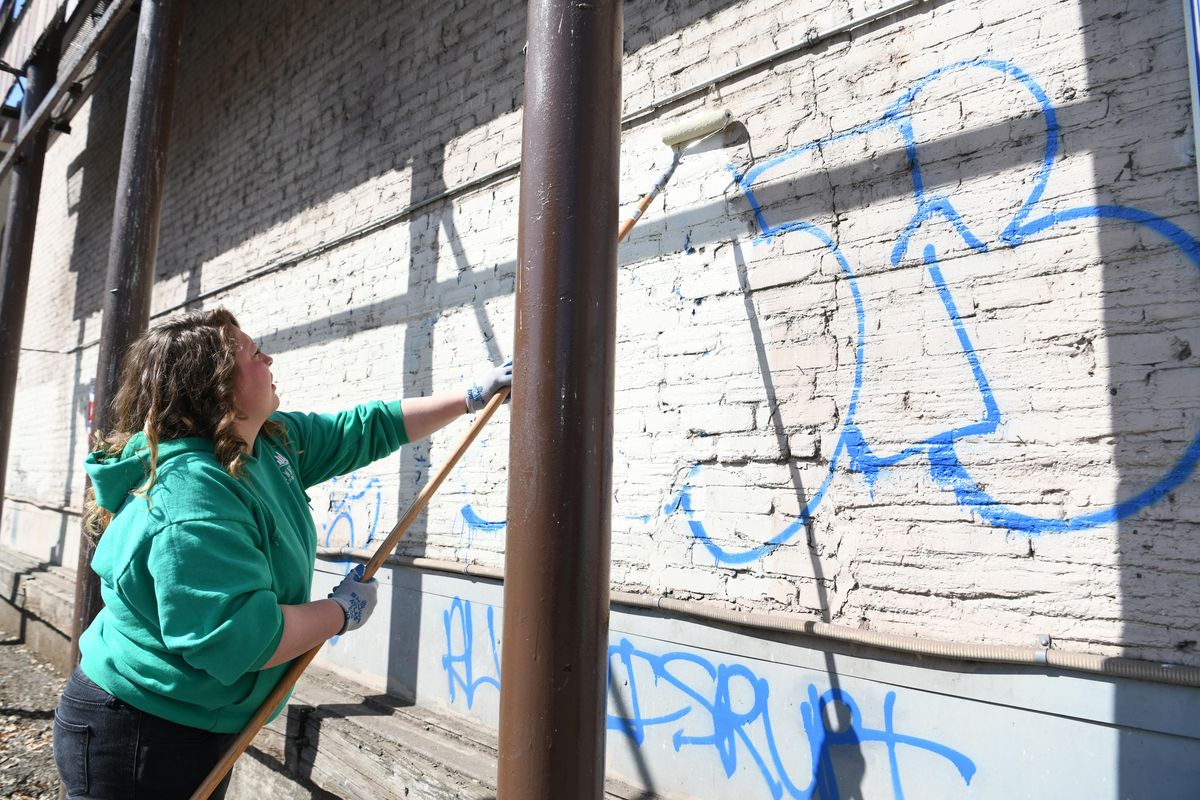Downtown team to use sophisticated washing equipment from city to scrub graffiti
Kaylyn Abdnor, who works for the Spokane Downtown Partnership on a cleanup crew, paints over graffiti on First Ave. between Stevens and Washington Streets on Friday, April 27, 2018. (Jesse Tinsley / The Spokesman-Review)Buy a print of this photo
Spokane is spending $100,000 on a new sophisticated sidewalk pressure washer and a custom utility vehicle to make the downtown area cleaner.
The big target: graffiti.
Members of the Downtown Spokane Partnership Clean Team say the presence of graffiti seems to be on the rise. They clean between five and 100 tags a day, team leader Natalie Love said.
She said removing graffiti takes time, but it’s worth it, because people associate it with crime, and that’s not what the Clean Team wants Spokane visitors to think.
The new equipment will be given to the Clean Team, a group that also cleans railroad underpasses and picks up trash on the street. The team will likely own and use the equipment, said Mark Richard, president of the DSP.
Richard said the contract with they city is still in the works. He said he expects to have the equipment by the end of June.
Richard calculated that Clean Team workers will save the program almost $30,000 annually by not emptying trash and recycling bins around the city, which were replaced in February with solar-powered bins, called Bigbelly cans. City workers have taken on those duties; last year the Clean Team removed 3,889 bags of trash.
The Clean Team will now spend those hours cleaning sidewalks with the new equipment, clearing more graffiti and cleaning railroad underpasses, according to Richard. Last year, the team cleared 1,045 pieces of graffiti, and Richard expects that number to rise.
The Downtown Spokane Partnership is a private, nonprofit organization that works with the city to keep the downtown area clean.
Dawn Kinder, director of neighborhood and business services for Spokane, said the city is still writing the contract for the equipment, which is capped at $101,000.
She said that right now, the intention is that DSP will own the equipment, but if it fails to uphold the contract, the city could take ownership.
New equipment
The pressure washer is trailer-mounted and allows water to be recycled.
Richard said it is important to use this sophisticated equipment because the downtown Spokane streets are vaulted, meaning there are cavities of space below them, and the city can’t use traditional Zamboni-like washers on them.
“I think having uniformly clean sidewalks will make a very nice difference in the downtown area,” Richard said.
Karen Fritz, member of the Clean Team, dresses in protective clothing on Tuesdays to clean the Browne’s Addition viaduct with bleach water.
“With the equipment, I think it’s going to be a lot cleaner,” she said.
The other piece of equipment is a Crossover Utility Vehicle, which will hold a tank for watering plants or spraying weeds, according to Richard. It will also have a de-icer and a snowplow for small jobs, like clearing wheelchair ramps, which workers have to do with shovels now. He said it will allow for the transportation of soil, tools and people.
“To do that, with this piece of equipment, is going to be a heck of a lot easier,” Richard said.
The new pressure washer will also allow the Clean Team to take over the responsibility of keeping sidewalks clean, which was formerly up to the business owners of the adjacent buildings.
“So if you drop an ice cream cone on the street, it might stay there for three weeks,” Richard said, and the Clean Team will soon be able to wash that up.
Graffiti on the rise
“Lisk,” “Acid” and “Feer” are some of the common graffiti tags that Love, leader of the Clean Team, has seen in her seven years with the team.
Love said she has noticed an uptick of graffiti in Spokane’s downtown in recent years, and vandals’ methods for sketching signals or words on the walls have gotten “creative.”
The team has seen truck bed liner spray used for graffiti, which is ultra-heavy duty and almost impossible for the members to remove. Street clean members use Goof Off to remove the graffiti, but sometimes that isn’t enough.
Team member Kaylyn Abdnor said she doesn’t think graffiti taggers mind their work being removed, even though the team suspects some of them are from gangs in Spokane. Instead, they think taggers care more about the act of tagging an unmarked surface – not the actual tag itself.
“Once you get a tag off, it kind of encourages people to do it again,” she said.
Dumpsters are a popular target for tagging, but the Clean Team doesn’t have the resources to clean them. Often tagged with wax pens and white-out-like paint, the smoother surfaces of dumpsters pose too big a problem for the team. Love said she would like dumpsters to be wrapped with vinyl designs, because she has noticed when electrical boxes are “wrapped,” they are less likely to be tagged.
The team is getting creative with their resistance, too. Love said she soon is getting specialized graffiti-resistant paint that will allow her to wipe it off the wall easily.
The team is looking for one more member to join their team, and for now, members will keep painting over as much graffiti as they can.
“It’s damaging to every building that it happens on,” Love said.

